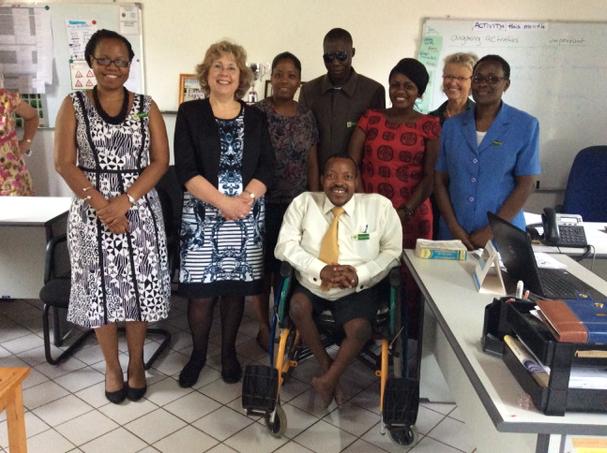Today is the first day of Baroness Northover’s visit to Tanzania, where she is championing the progress of development programmes supported by DFID. The trip’s overarching theme is ‘leave no one behind’ – a key principle the UK is aiming to ensure is central to the Sustainable Development Goals that will replace the Millennium Development Goals later this year.
Tanzania is growing fast – seven per cent per annum for the last five years – and that rapid expansion is highly evident as we land in Dar es Salaam. Driving out from the airport past the port, ships are queuing to come in to offload, with the traffic on the roads almost immobile.
This is a city, and a country, that is on the move. The challenge is that the direction of travel remains inclusive, and that no one is left behind.
Today I visited the Comprehensive Community Based Rehabilitation in Tanzania (CCBRT) Hospital, a locally registered NGO, which is the largest Tanzanian provider of disability services in the country. CCBRT aims to empower people with disabilities and their families, to improve quality of life and ensure access to medical and rehabilitative treatment. DFID has been supporting CCBRT through our Human Development Innovation Fund.
Here I meet baby Joshua, happily sitting on his mother’s lap. He has undergone an operation and is about to return home, clearly with a huge relish for life and all it has to offer.

Of the one billion people globally who have a disability, 80 per cent live in developing countries. Despite this, disability remains a neglected issue in development work. DFID is prioritising ‘disability-inclusive’ development and I will be launching DFID’s first newsletter on disability-inclusive development on Wednesday. So it is brilliant to be able to visit an organisation carrying out important and life-changing work in this area.
At the hospital, I meet CCBRT’s advocacy team. Francis, the team leader, welcomes me into their office for a chat about the team’s work and the current outlook for people with disabilities in Tanzania. His team is a model of inclusivity, as people with visual, hearing and physical disabilities work side-by-side in what Francis describes as the ‘perfect combination’.
The team has been in place since 2010 and carries out advocacy services both within the hospital – for instance to ensure that all its services are fully accessible – and outside, where it plays an active role in championing the rights of people with disabilities, including in education and employment. The key message is that inclusivity benefits everyone, because people with disabilities have a valuable contribution to make to society. This is clearly demonstrated by the team’s inspiring work.

And, together with their partners, they are having an impact. Francis explains how the previous constitution made reference to people with disabilities in only one of its articles. The new constitution, to be voted on in a referendum later this year, references people with disabilities in twelve articles – a direct result of lobbying and advocacy on this issue.
Change can and will happen, the team explains, if we all continue to work together. Embedding disability into the country’s constitution – or “mother law” as Francis calls it – allows work to progress in implementing the rights of people with disabilities in health, employment, education, and all other sectors.
In the meantime, the team and their supporters will continue striving to change attitudes towards people with disabilities – to ensure that no one is left behind.
Tomorrow Baroness Northover will update you on her next trip – up to Dodoma to galvanise work supporting women and girls, another group so often left behind.

1 comment
Comment by Archie Hinchcliffe posted on
The children with disabilities who are being left behind are the ones who are born with or develop cerebral palsy at a very early age. WHO reckons on the number being one in every 300 live births, but because of the stigma attached to the belief that such children are cursed combined with the fact that there are very few rehabilitation services with specialist knowledge and training to support families the children are very often hidden away. We in Cerebral Palsy African are trying to redress that but we are a very small charity and find it difficult to convince such donors as DfID that they should support our work.
We train local physiotherapists or occupational therapists to identify and assess the children at risk and start advising the mothers as soon as possible so that the children can be facilitated to develop their full potential and avoid secondary impairments. There will never be enough therapists to reach out to all such children in the countries where we work so we also train community rehabilitation workers to act as partners to the therapists and give support to the families at home in carrying out the treatment programme. Finally we teach mothers and CBR workers to make the chairs and standing frames essential for children with CP to learn to sit and stand and use their hands to play. These are made from waste paper and cardboard and are strong, appropriate and tailor made for each child. In Malawi, Zambia, Ghana and Kenya where we have been working we believe we can show the impact of such rehabilitation.
But nowhere in the new goals is there mention of children with disabilities having the right to early and effective rehabilitation. Without this a significant proportion of them cannot be integrated in the schooling system or accepted in society and it seems to us that this is a shameful neglect of a what we know is a very large number of children.
Archie Hinchcliffe
Executive Director
Cerebral Palsy Africa